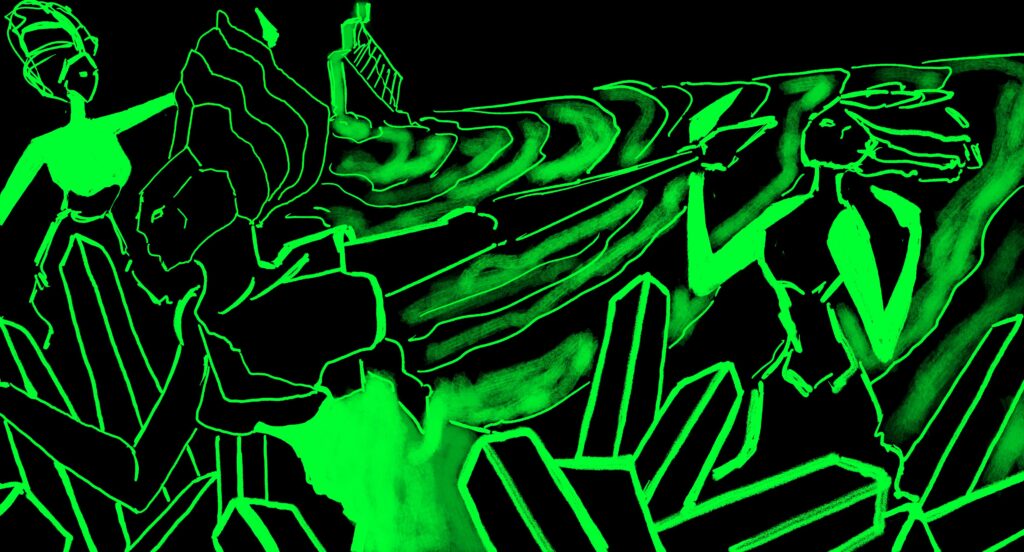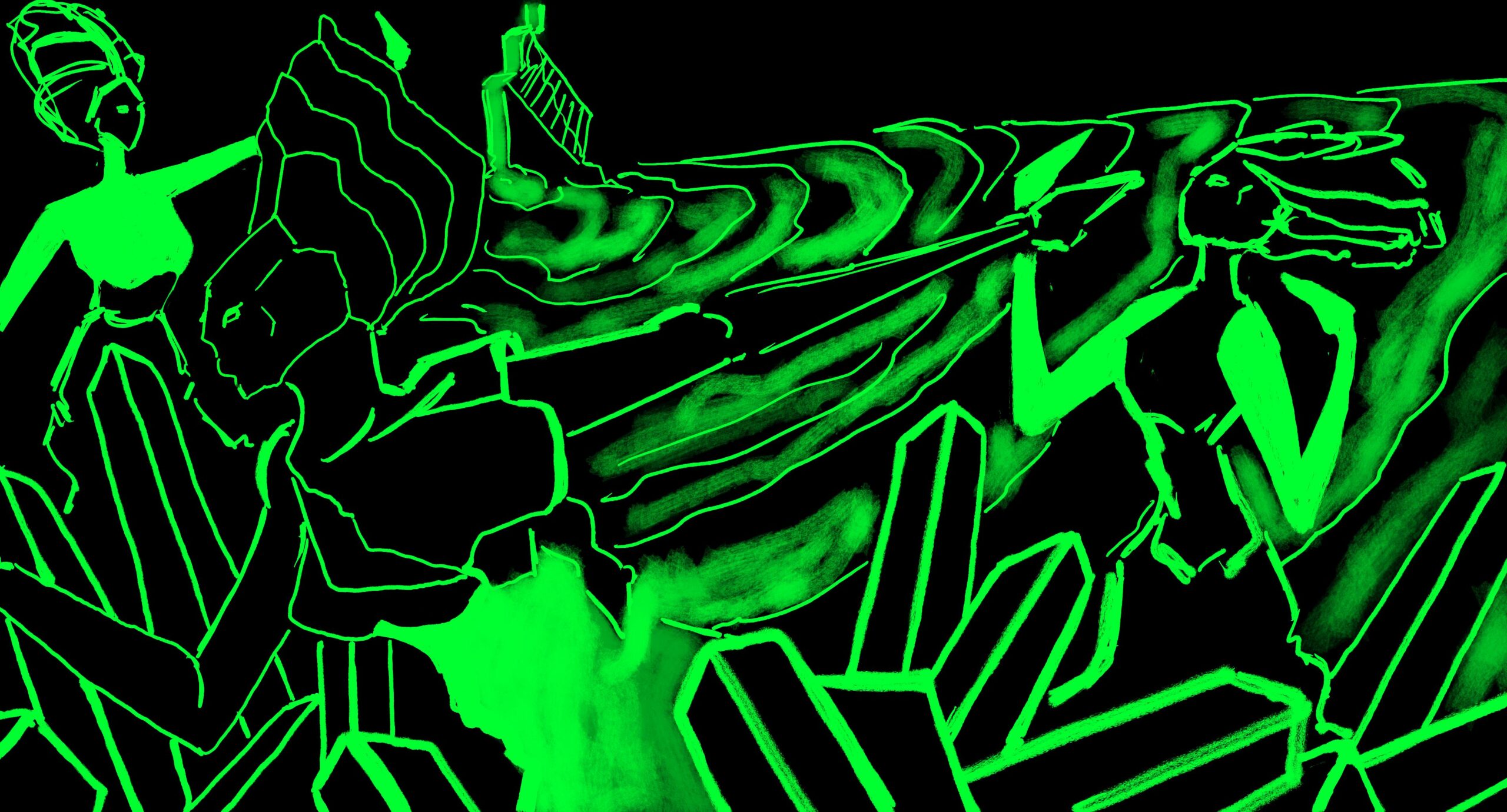
- Every Story is a chain of Encounters.
- Discoveries & Crisis, punctuated by phases of Rest.
- Each Scene is an Encounter.
- How do you create surprising Encounters?
Summary – 6 steps to memorable Encounters
- Define the Atmosphere
- Define the Issue
- Define the Stakes
- Define the Options
- Fight
- Negotiate
- Flee
- Define the Outcome
- Define the Aftermath
- Encounters Rhythm your Story.
- They entice all to pursue the Story.
- How do you make use of them to maintain the Public & the Character’s interest?
Diversity
- Atmosphere
- 1st, you need to Frame the Encounter.
- Environments are defined by their Colors.
- As well as the impact of Light on them.
- The Environment influence Characters.
- It forces them to adapt & develop their skills.
- Potential Dangers make an Environment more alive.
- Every menace encountered by the Characters is a new Souvenir.
- As well as the Scarcity of a specific resource can put them in an deadly situation.
- The Rhythm of the environment defines the Rhythm of the Characters.
- Type of Interaction
- Your Characters may interact with other Characters.
- The Character’s goal is core to define the Interaction.
- And how it aligns with the Character’s behavior.
- She may be benevolent.
- She may be hostile.
- Her intentions may be undetermined.
- There may be no direct opposition in the mean time.
- But she could oppose the Characters later.
- Your Characters may interact with Environments.
- They may Discover one.
- Chose to Explore one.
- Or even Collect resources.
- Resolution
- The Resolution of an Encounter is defined by the other Character’s Intentions.
- There are different Type of oppositions.
- As well as different Type of alliances a Character can form.
- Your team may want to get the attention of another Character.
- Or to get rid of another Character.
- The Most common resolution Options are :
- Fight/Taunt/Threaten
- Negotiate/Trade/Corral
- Flee/Hide/Distract
If you want to know more about Diversity & Improvisation.
Intensity
- Weak
- When it comes to weak encounters there are 2 main questions to consider :
- Should your Character allocate time to this Encounter?
- Should she make use of violence?
- If your Character is superior to her enemy she’s unlikely to waste her energy on this enemy.
- Likewise if it is a weaker ally.
- Weak Characters may be in need of help though.
- They may be in possession of a valuable piece of information.
- Should your Characters help them?
- Is it a valuable use of their time?
- Strong
- Strong Encounters are based on Opposition.
- But opposition doesn’t mean Hostility.
- Characters may be opposed in early stages and ally later.
- Strong Characters tend to have High Goals.
- Therefore, these Characters should have valuable skills.
- Why not recruit them?
- A Strong encounter is also an Unusual Encounter.
- Create out-of-boundaries Creatures & Characters.
- Individuals which behave differently than the rest of their Species.
- With Specific Quirk in order to make them more memorable.
- Mixed
- Mixes Encounters are Surprising.
- They are meant to Shock the Characters.
- Often they will take the form of a group of multiple Creatures.
- These can be Different type of Creatures.
- Or Different Groups size.
- The Nature of these Groups can be the Shocking element.
- As well as The Nature of the Alliance.
- The Heart of the Surprise resides in the Shocking nature of the Alliance.
- For best results, ally 2 Groups which should be Enemies.
If you want to know more about Intensity & Consistency.
Escalation
- Simple Issues
- Simple Issues are Common Issues.
- They take place in Mild Environment.
- Daily Issues make your world more believable.
- As they are simple they have Simple solutions.
- They can be solved through peaceful resolutions.
- Most often they should be solved through cooperation.
- However, frustration may accumulate as these mundane issues do.
- And because of this frustration certain characters may cause more mayhem.
- Threats
- Threats feel more Dangerous is the Environment is against the Characters.
- Weather is a way to create Danger.
- Structure are meant to have dangerous Specificities.
- The very Setting can be Unstable.
- There can be hostile Inhabitants.
- There can be Traps.
- The Characters may face a Strong Opposition.
- They should be pressured by their opponents.
- They should face opponents which Use new Skills.
- Threats Limit the Characters Alternatives.
- And Characters should look for the most efficient alternative.
- If peace is an option so be it.
- But if it isn’t, they should try to force it.
- Immediate Threats should be treated at a Fast pace.
- Which long term Threats should be treated at a Slower pace.
- Crisis
- Crisis are Harsh.
- They should leave the Characters scared.
- Crisis imply Deadly Environments.
- And Antipodal Opposition.
- During a Crisis there is Little to no way to reason an opponent.
- Catastrophes are an efficient way to create Crisis.
- Wherever they are Natural or Engineered Catastrophes they should be large-scaled.
- Solving a Crisis is a Slow & deliberate process.
- The Characters should be attentive.
- They should try to Intimidate the opponent.
- As the opponent is likely to Trivialize them.
- All their focus should be on Survival.
- Fleeing is an Option.
If you want to know more about Escalation & Pain.
Surprise
- Hidden Character
- Characters’ intention are essential to determine their role.
- Some Characters may hide their intentions.
- The Character may be hidden :
- Literally – hidden Character
- Figuratively – Character whose Role was hidden
- There are 2 main cases of hidden Characters :
- Hidden Hindrance
- Hidden Benefactor
- In the case of a hidden benefactor there may be a counterpart Eventually.
- The main appeal of Hidden Characters is Mystery.
- Then the Characters should Unveil her Identity.
- As well as her motives.
- A 3rd party
- An Unidentified organization may appear later in the Story.
- It can be an especially late point.
- Maybe near the Conclusion.
- The Later it is, the Simpler the explanation should be.
- 3 Questions should be answered if a 3rd party appears :
- Why wasn’t it part of the conflict?
- Why is it now?
- How do they plan to thwart the other 2 sides?
- You can them imagine multiple outcomes :
- The 3rd party sides with party A
- The 3rd party sides with party B
- The 3rd party destroys party A
- The 3rd party destroys party B
- The 3rd party opposes both parties
- The 3rd party wants to ally with both parties
- Alignment shift
- Why would a Character change sides?
- If they are given a Better Life elsewhere.
- Characters change sides when they are given more Consideration.
- It could be materialized by a higher position in an organization.
- They could be Pressured to save one’s life.
- Maybe the Character’s own life.
- The shifting Character should be looking for a Reward.
- There are 3 main types of Rewards :
- Experiences & Sensations
- Opportunities & Titles
- Information
